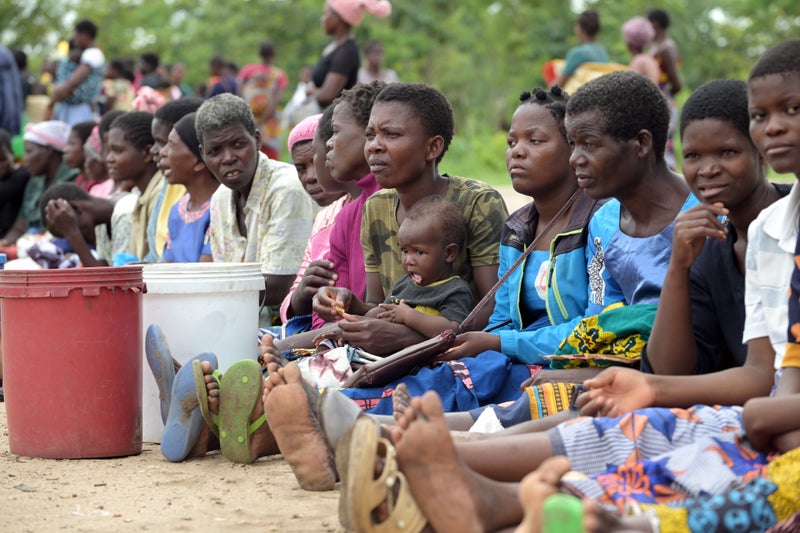A charity leader is sounding the alarm with an estimated 21 million children suffering from malnutrition. Children in Southern Africa are going hungry following the region’s worst drought in 100 years, as a charity leader warns they are ‘desperate’ for support. The El Niño weather cycle, which can cause extremes of both drought and wet weather, has had a devastating effect on crop planting and harvesting over the last three years. It’s estimated 21 million children in the region are suffering from malnutrition and harvests in 2025 again look set to be poor.
![[People queue to buy maize at government guided prices]](https://static.independent.co.uk/2025/02/12/10/49/RS24839_ZZCS_0228.jpeg)
In October 2024, a third successive seasonal planting window was disrupted by unusually high temperatures and lack of rain. The majority of the rural population across Southern Africa survives on subsistence agriculture and for farmers working their own smallholdings, the climatic conditions have been catastrophic. Not only have their crops failed to thrive leaving little to harvest, but food has become scarce and more expensive - the cost of maize and cooking oil has doubled in the last year.
![[Six countries have declared a state of disaster in response to the drought]](https://static.independent.co.uk/2025/02/12/10/17/RS24849_ZZCS_0245.jpeg)
The challenges facing farmers go beyond poor harvests and rising food costs too. In Malawi, the cost of fertiliser has risen by approximately 64% since 2023 making it impossible for many families to afford. Given the 2024 sowing conditions, the next harvest season in April and May this year is also likely to be meagre. Six countries have already declared a state of disaster. Following a visit to Malawi last month, Mary’s Meals Founder and CEO Magnus MacFarlane-Barrow has sounded the alarm that children are on the ‘brink of disaster’ as he calls for urgent help to expand school feeding programmes in Malawi, Mozambique, Zambia and Zimbabwe, which can prove to be a lifeline in desperate times like this.
![[Crops have been planted and re-planted, but won’t grow as they need to without rain]](https://static.independent.co.uk/2025/02/12/10/52/RS24854_ZZCS_0340.jpeg)
Mary’s Meals provides daily meals to more than 2.4 million children in 16 of the world’s poorest countries, attracting them into the classroom, where they can gain an education and hope of a brighter future. Malawi is home to Mary’s Meals’ largest school feeding programme, serving more than 1 million children every school day. Magnus says: “I visited Tafika Primary School in Malawi to see the extent of the situation. We started feeding in this school in October 2024 and everyone we met, children and adults, told us what a lifeline the Mary’s Meals porridge is to them at this time.
![[Feeding time at Dzunga Primary School, Malawi]](https://static.independent.co.uk/2025/02/12/10/49/RS24860_ZCS_8746.jpeg)
“Most children are eating just this one meal a day as food is so scarce and expensive. This is largely a subsistence economy and the recent poor harvests have led them to the brink of disaster. We are desperate to roll out our simple school feeding programme to reach more children as soon as we have funds. “The hunger situation is extreme here but, with Mary’s Meals, children’s need for food is being met while their potential for learning is unlocked. The food they receive now will help them, in time, to play their part in figuring out what and when to plant to feed themselves, and their families, while consistent education can be a ladder out of poverty and provide hope for a brighter future.”.
![[The Mary’s Meals feeding programme in action at Dzunga Primary School]](https://static.independent.co.uk/2025/02/12/10/23/RS24864_ZCS_8776.jpeg)
Desire, aged 12, is the youngest of four siblings and a student at Tafika Primary School, which is a 6km walk away from his home. His mother sells small fish which she gets from a trader on the river. Desire tries to help her and sometimes gets to eat the fish too. But finding food is hard and he often sleeps on an empty stomach. Desire says: “I feel weak and pain in my body when I don’t eat. When there was no food at school, I would be shivering and tired.
![[Children wait for their daily serving of porridge at school]](https://static.independent.co.uk/2025/02/12/10/07/RS24870_ZCS_8859.jpeg)
“I would shiver and shake so I couldn’t hold my pen and it was difficult to concentrate. Sometimes I would have to leave school to go and try to find food.”. Desire still regularly falls asleep without having had any dinner, but since the arrival of Mary's Meals at Tafika in October, he receives a nutritious meal in school, ensuring he is fed during the day, which provides immediate relief to him and his mother. Meanwhile he is gaining a vital education in class. He says: “I like the porridge, it helps me concentrate.”.
![[Porridge encourages children into school where they can gain an education]](https://static.independent.co.uk/2025/02/12/10/32/RS24874_ZCS_8705.jpeg)
Agness Wakili, the head teacher at Tafika Primary, has witnessed the devastation the drought has had on her pupils, their families and the whole community. She’s aware that despite their efforts, crops won’t grow in the current climate, and the agony will continue. Agness says: “Each and every family in our district suffers from hunger. “The harvest will be very poor because of the drought. The maize is stunted and won’t mature properly. People had to plant again in December because the rain didn’t come, but still the crops haven’t grown as they should.
![[Desire, a 12-year-old student at Tafika Primary School, Malawi]](https://static.independent.co.uk/2025/02/12/10/33/RS24892_ZZCS_0171.jpeg)
“People don’t eat at home because there is nothing to eat. Even the adults are starving.”. Yet, as the drought continues to cripple millions in Malawi and across Southern Africa, for some, there is hope, provided by Mary’s Meals porridge. Agness continues: “We have seen an increase in enrolment because of the porridge. All the children around here are malnourished and very hungry but now since the porridge, they are not so sick.
![[As well as poor harvests, families are having to contend with escalating food prices]](https://static.independent.co.uk/2025/02/12/10/11/RS24908_ZCS_9118.jpeg)































